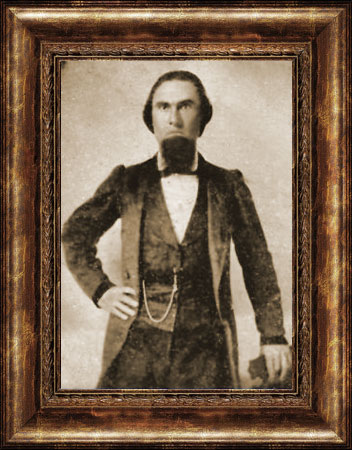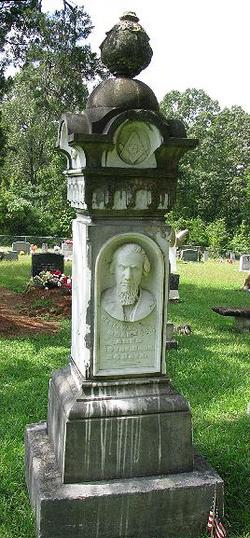
No uniformed photograph exists of General Brantley
William Felix Brantley was born in Alabama in 1830. His parents moved to Mississippi while he was a youngster. Brantley became a lawyer in Greensboro, Mississippi in 1852. He voted to take Mississippi out of the Union and became captain of Company D, 15th Mississippi Infantry. He led his company at the Battle of Mill Springs in Kentucky in January of 1862.
They then moved to Corinth, Mississippi and he led the company in the Battle of Shiloh in April. When the regiment was reorganized, Brantley was elected lieutenant colonel of the 15th Mississippi Infantry. He fought again at Munfordsville, Kentucky, but missed the Battle of Perryville. He would be promoted to colonel and lead the regiment at the Battle of Murfreesboro. There, he was slightly wounded by an exploding artillery shell in the fight for the Cedar thicket on the Union right flank. He would lead a regiment at Chickamauga and fight near the Craven's House on Lookout Mountain in Chattanooga. He was praised for his courage there.
During the Atlanta Campaign, his men withstood assault after assault at Resaca all while receiving enfilade fire from Union artillery. They saw repeated action during the Atlanta Campaign. When Samuel Benton was mortally wounded at Atlanta, Brantley was promoted to brigadier general of the Mississippi Brigade. He led his brigade into the unsuccessful Battle of Ezra Church. They would lose heavily there and again at the Battle of Jonesboro.
The recently exchanged Major General Edward Johnson of Robert E. Lee's Army would soon command Brantley's Brigade. They would advance into Tennessee and become participants in the horrific fighting at Franklin. His corps commander Lieutenant General Stephen D. Lee would praise both Brantley and Zachariah Deas's troops for their actions in the bloody fighting there. His brigade advanced after dark against the area just west of the Carter House. After the repulse, Major James Ratchford wrote, "After the firing had ceased, about midnight, I was sent along our corps front with orders from General Lee to the Brigadiers and Major Generals to get ready for a renewal of the fight at daylight. I found General Brantley, who had commanded a Mississippi Brigade, sitting almost stupefied on the ground near the line of battle. I gave him the order, but he seemed not to hear me. I put my hand on his shoulder and tried to rouse him, repeating the instructions for his brigade. He mumbled, 'I have no brigade.' I asked him where the men were, and he replied, 'They're all dead.' I said, 'Surely not all,' and added that if he did not make some effort to get his men together, I would be compelled to report it to General (Stephen D.) Lee. He roused himself then and said, 'I'll see if there are any left.' The next morning he had gathered up about two hundred men, all that remained of a whole brigade that went into the fight." A brigade during the Civil War usually consisted of 1500 to 2000 men.

A pre-war image of William Brantley
Brantley's dead were in the trenches and on the earthworks near the Carter House. He took the remnants of his brigade on to Nashville, where they faced Steedman's black troops. They held part of the line on the extreme Confederate right. They would get their vengeance there for the suffering they received at Franklin. They repulsed a desperate charge at Nashville. Following the campaign, he would reform his brigade in Mississippi. They numbered 152 men by this time.
Following the war, he returned to Mississippi and his law practice. He'd been warned about travelling between Winona and Greensboro, Mississippi, but he'd replied that he would travel wherever his business took him. He'd survived four years of bloody Civil War, to be killed in a shotgun blast on the road between the two towns. He was in the process of bringing the murderers of his brother Arnold to justice. His assailants were never found. His brother Edmund was killed in a duel. Another brother John was killed in Texas by David Balzell. In 1870, his brother Arnold, the mayor of Winona was shot dead in cold blood. William was attempting to bring his murderers to justice when they ambushed and killed him.
It was said of Brantley, that he would not turn from doing what was right once his mind was set. He was a fearless man, as can be proved by his Civil War record. He rests today in the New Greensboro Cemetery, Webster County, Mississippi. He was 40 years old.

The grave of William Felix Brantley
No comments:
Post a Comment